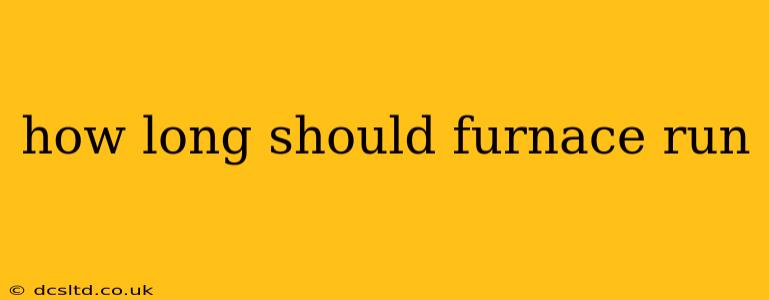How Long Should Your Furnace Run? A Comprehensive Guide
Determining how long your furnace should run is more nuanced than simply stating a specific timeframe. The ideal runtime depends on several factors, including your home's size, insulation, climate, thermostat settings, and the furnace's efficiency. However, we can explore this question thoroughly and provide guidelines to help you understand what's normal and when you might need professional help.
How long should a furnace run per cycle?
A typical furnace cycle, from ignition to shutdown, should last anywhere from 15 to 30 minutes. However, this is just a general range. Several factors influence the duration of a single cycle:
- Thermostat settings: A lower thermostat setting will result in shorter cycles, while a higher setting means longer cycles.
- Outside temperature: Colder temperatures require longer run times to maintain the desired indoor temperature.
- Furnace efficiency: A more efficient furnace might require slightly shorter run times to achieve the same level of heating.
- Home insulation: Well-insulated homes retain heat better, leading to shorter furnace cycles. Poorly insulated homes require longer run times.
If your furnace consistently runs for much longer than 30 minutes per cycle, or cycles on and off very frequently (short cycling), it could indicate a problem. This is often a sign of an issue that needs professional attention.
How often should my furnace cycle on and off?
The frequency of your furnace cycling depends on several factors similar to the length of a single cycle. However, you should be aware of potential problems if it's cycling too frequently or not often enough.
- Frequent short cycling: This indicates the furnace might not be providing enough heat to meet the thermostat's demand. Possible causes include a dirty air filter, malfunctioning thermostat, or issues with the furnace's components.
- Infrequent long cycles: This could mean the furnace is struggling to keep up with the heating demand. Possible causes include a failing blower motor, a clogged heat exchanger, or insufficient airflow.
In both cases, it is essential to call a qualified HVAC technician for inspection and repair. Ignoring these issues can lead to decreased efficiency, increased energy bills, and even potential safety hazards.
How long should my furnace run continuously?
Your furnace should not run continuously for extended periods. Continuous operation is a strong indicator of a serious problem. This could be due to issues with the thermostat, airflow problems, or a faulty component within the furnace itself. Continuous operation should always be addressed by an HVAC professional immediately.
Is it normal for my furnace to run for hours?
No, it is generally not normal for your furnace to run for several hours without cycling off. While exceptionally cold weather might lead to longer run times, hours of uninterrupted operation suggests a significant problem that warrants immediate professional attention.
What should I do if my furnace is running too long or too short?
If you notice that your furnace is running for unusually long or short periods, or cycling on and off too frequently, you should:
- Check the air filter: A clogged air filter restricts airflow, causing the furnace to work harder and potentially run longer or short cycle. Replace it if it's dirty.
- Check the thermostat: Ensure it's properly calibrated and functioning correctly. A faulty thermostat can lead to inconsistent heating and improper furnace operation.
- Call an HVAC technician: If the problem persists after checking the filter and thermostat, contact a qualified HVAC professional for diagnosis and repair. Ignoring these issues could lead to costly repairs and safety concerns.
By understanding the factors that influence your furnace's runtime, you can better monitor its performance and identify potential issues before they become major problems. Remember, professional maintenance is crucial for ensuring your furnace operates efficiently and safely throughout the heating season.
